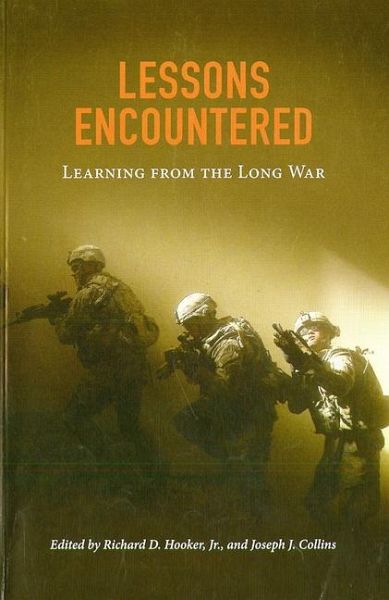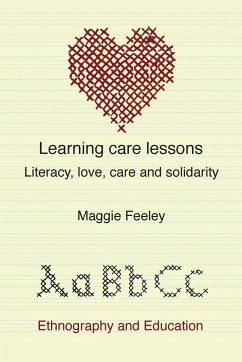Nicht lieferbar

Lessons Encountered: Learning from the Long War: Learning from the Long War
Versandkostenfrei!
Nicht lieferbar
Historical Lessons from Operation Enduring Freedom in Afghanistan and Operations Iraqi Freedom and New Dawn in Iraq may appeal to senior officers and military science students This publication assesses the Long War, now in its 14th year. Forged in the fires of the 9/11 attacks, the war includes campaigns against al Qaeda, major conflicts in Iraq and Afghanistan, and operations in the Horn of Africa, the Republic of the Philippines, and globally, in the air and on the sea. This assessment proceeds from two guiding sets of questions about the wars in Iraq and Afghanistan. The core set of questi...
Historical Lessons from Operation Enduring Freedom in Afghanistan and Operations Iraqi Freedom and New Dawn in Iraq may appeal to senior officers and military science students This publication assesses the Long War, now in its 14th year. Forged in the fires of the 9/11 attacks, the war includes campaigns against al Qaeda, major conflicts in Iraq and Afghanistan, and operations in the Horn of Africa, the Republic of the Philippines, and globally, in the air and on the sea. This assessment proceeds from two guiding sets of questions about the wars in Iraq and Afghanistan. The core set of questions was suggested by the Chairman of the Joint Chiefs: What did we gain? What did we lose? What costs did the United States pay for its response to 9/11, particularly from operations in Afghanistan and Iraq? How should the answers to these questions inform senior military leaders' contributions to future national security and national military strategy? The second set of questions proceeds from the first: what are the strategic "lessons learned" (or "lessons encountered," as the British and the authors of this work prefer) of our experience in Operation Enduring Freedom (OEF) in Afghanistan, and Operations Iraqi Freedom (OIF) and New Dawn in Iraq. The book is divided in this manner: chapter one focuses on the early, pre-Surge years in both campaigns. Chapter two continues the chronological thread but focuses on assessment and adaptation in the Surges in Iraq and Afghanistan. Chapter three examines decision making at the national level and implementation. Chapter four discusses security force assistance, the coalition's development of indigenous armies, and police forces. Chapter five analyzes the complex set of legal issues attendant to irregular conflict, including detention and interrogation policy. Chapter six develops the capstone conclusions of the study and isolates the most important lessons. Supporting these chapters are three annexes: one on the human and financial costs of war, and, for reference, two others on the key events in both campaigns. To orient the reader, the lessons encountered in these chapters are divided into a few functional areas: national-level decision making, unity of effort/unity of command, intelligence and understanding the operational environment, character of contemporary conflict, and security force assistance. This historical edited volume is intended for future senior officers, their advisors, and other national security decision makers. However, the content could also prove useful to students in joint professional military courses and military science classes that may qualify them for work in the field of strategy. The authors herein treat only the campaigns in Afghanistan and Iraq, the largest U.S. efforts.The primary objective is intended to provide information and guidance to future senior officers, their advisors, and other national security decision makers. By derivation, it also can be a book for students in joint professional military education courses, which will qualify them to work in the field of strategy and military oriented civilians. While the book tends to focus on strategic decisions and developments of land wars among the people, it acknowledges that the status of the United States as a great power and the strength of its ground forces depend in large measure on the dominance of the U.S. Navy and U.S. Air Force in their respective domains. Audience: military senior officers, military advisors, national security decision makers, professors of military history and warfare












![The Normal School for Ontario [microform]: Its Design and Functions Cover The Normal School for Ontario [microform]: Its Design and Functions](https://bilder.buecher.de/produkte/65/65596/65596684n.jpg)
